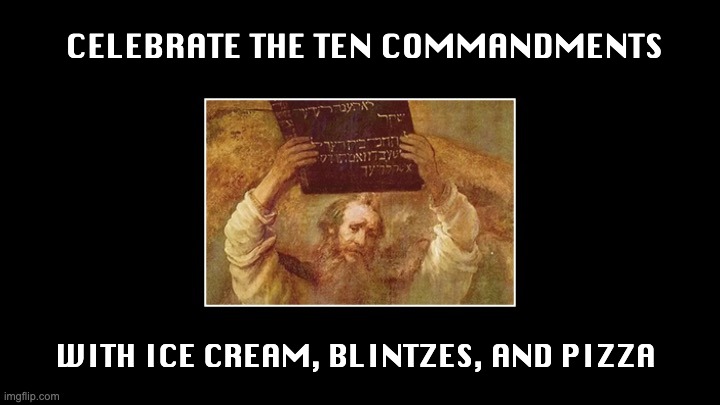Beginning with the sunset on Thursday, May 25th, Jews worldwide will start to observe Shavuot, my favorite of all the Jewish holidays (more on that later).
Shavuot commemorates that incredible day when God himself spoke publicly to the newly freed Hebrew slaves about the Torah and what is popularly known as the Ten Commandments.
Historically, Shavuot celebrates the giving of the Torah at Mount Sinai. Thus, it’s also known as Hag Matan Torateinu (the Festival of the Giving of Our Torah). Notice it says giving of the Torah, not receiving of the Torah. Jews believe we constantly receive the Torah, learn its meanings, and understand the mitzvot. Therefore, using the receiving doesn’t work because every day is the time for receiving the Torah.
Interesting Facts about Shavuot:
Mount Sinai: We are taught that Mount Sinai was chosen because it was a “modest-sized mountain” One might think it was because Moses was kind of an old guy when he had to climb the mountain. He had to climb up and down four times, and he was an 80-year-old man who spent the last fifty days listening to 603K Hebrews complain about the food (a Jewish tradition still followed today).
God chose a moderately-sized mountain to show that man did not have to be large in stature to meet his potential. Another reason Sinai was chosen was that it was outside of the Holy Land. The laws given at Sinai are fundamental and should apply to all people. Since the commandments were given outside of the Holy Land, God could legitimately demand that these basic rules about how people should live their lives apply not just to Jews but to all people.
What Moses looked like: How the heck would I know? But I can tell you for sure he didn’t look like Charlton Heston or the traditional ways Moshe Rabbeinu (Moses the teacher) has been portrayed in movies and art. Think about it—the guy was the child of Hebrew slaves raised in the court of Pharaoh–why would he look like a tall Middle Ages Westerner? Sorry to burst your bubbles (and BTW, for those in the cancel culture crowd, we know his wife was black).
The Revelation at Sinai. Think about this for a second. The Torah says there were 603,000 people at Sinai to hear God’s words in God’s voice. The first words of the Ten Commandments were also heard directly from God speaking to the nascent Jewish people, and not through Moses as an intermediary. Jewish tradition explains that the experience was so powerful that the newly freed slaves “died” from the impact of hearing God’s voice (I guess he didn’t sound like George Burns in “Oh God”). The rabbis tell us that their souls actually left their bodies from the force of the Big Guy’s voice, and He had to “revive” them. After this happened twice, the Jewish people said, “Enough! We’re convinced. God, why don’t you tell Moses, and he can tell us the rest” I bet God was also relieved. It can’t be easy to revive 600K+ people. Here’s the crucial part of the revelation at Sinai that most people don’t realize.
There is no other religious event in the history of mankind where the presence of God was seen and heard by an entire nation. Some may be thinking, “It is all a fable and never really happened.” Those are the ancestors of the people who believe the moon landing was staged in a studio in Brooklyn. There is proof it wasn’t staged. When astronauts looked out of their windows, they didn’t see Nathans or the Coney Island Cyclone Roller Coaster.
Unlike the moon landing, there is no way to prove the story of the revelation at Sinai happened (that’s why it’s called faith). But ponder this: There were more than six hundred thousand witnesses. Not one of those witnesses wrote a minority opinion. No accounts from that time say the entire lawgiving thing was done on a sound stage in Brooklyn or that it wasn’t God from on high–it was Moses wearing stilts or standing on wooden boxes while reciting the commandments off his iPad and speaking through a bull horn.
The first word of the Ten Commandments, Anochi (I am), is not in Hebrew. It’s in Egyptian. There are 50 days between when the Jews left Egypt (Passover) and they got the law at Sinai (Shavuot). That’s not a lot of time, especially considering that the nascent Jews were slaves for a few hundred years. They weren’t even away from Egypt long enough to forget the phone numbers of the best Egyptian pizza delivery joints.
The Lord wanted these newly free people to feel comfortable, so he started with an Egyptian word, bringing up the question–if the revelation at Sinai happened today, would the first words be “Dudes, those Iranians are nuts. I’m the real Supreme leader.”
They’re not really called the Ten Commandments, at least in Judaism. In Biblical Hebrew, what is commonly called the Ten Commandments are called עשרת הדברים (transliterated Aseret ha-Dvarîm). The English translation is “the ten words” or “the ten things.”
I know some people are thinking, “The Ten Words!!??
That’s kind of a letdown. Aren’t those the most important commandments in the Torah?”
There are 613 commandments in the Torah. The ten words are not more important than the other 603 commandments in the Torah. The Pirkei Avot, a book of the Mishnah, teaches, “Be as meticulous in performing a ‘minor’ mitzvah as you are with a ‘major’ one because you don’t know what kind of reward you’ll get for various mitzvot.”
The Ten Words have no “Thou Shalts.” Our maker is a “bottom line” type of guy. There are no extra words in the big ten or the entire Torah, for that matter.
Don’t forget fitting all of those Hebrew words on stone tablets had to be small enough for an 80-year-old man to carry down a mountain is not easy. So, there was no room for thou shalts,” nor were there any “thou shalt nots” in the Ten Words.
Those are all fancy words added by humans who thought God’s words needed embellishments. Either that or when it was translated from the Hebrew text, the translators were paid by the word.
Folks, we are talking about the word of God—the creator of the universe. The omnipotent being who created the universe, even the part where James Tiberius Kirk boldly went where no man had gone before.
No commandment says, “Don’t Kill.” לֹא תִרְצָח translates as “Don’t Murder ‘If it said “don’t kill,” then acts of self-defense, war, accidental killings, etc., would be punished—they’re not. Only murders. The kind you would watch on Oxygen TV or Discovery ID.
Moses’ Father-in-Law Gets Top Billing? The Parsha’s (weekly Torah reading) name in which the revelation at Sinai occurs is not named after the Ten Commandments or Moses. It is called Yitro—named after Moses’ father-in-law, who wasn’t even Jewish.
Only two Parshot in the Torah are named after a non-Jew, so this is a big deal. At the beginning of this Parsha, Yitro sits Moses down and explains that he needs to delegate responsibility because he needs to spend more time with his family. From this, we learn that to God, Shalom Ha-Bayit (peace in the home) is more important than anything, even the revelation at Sinai. Mankind spending time with family is important to God. We also learn from the name of this Torah read that fathers-in-law are not only allowed to but are supposed to butt in—at least, that’s what my father-in-law tells me.
All Night Study Sessions: On the first night of Shavuot, the tradition is to spend the evening studying. That’s because the Rabbis tell us that the children of Israel all forgot to set the alarms on their iPhones and overslept at the revelation at Sinai. They base that claim on what it says in Exodus 19:16: “It came to pass on the third day when it was morning, that there were thunderclaps and lightning flashes, and a thick cloud was upon the mountain, and a mighty blast of a shofar, and the entire nation that was in the camp shuddered.”
The sages tell us that this verse says that God was already on the top of Sinai, waiting for the Hebrews to wake up, but the newly freed slaves overslept. The Lord had to make a heck of a racket to get them to wake up. That’s why on the first evening of the holiday (Thursday night this year), synagogues worldwide have what’s called Tikkun Leil Shavuot (repairing the Evening of Shavuot). Jews spend all night studying Torah to make up for the fact that they screwed up and overslept at Sinai. This is to show God that we appreciate the Torah he gave us, and there will be no grabbing an extra few winks this time. And to help them to stay awake–Jews eat good stuff while studying all night.
The Chosen People? The Torah and the Aseret ha-Dibrot are why the Jewish nation is called “the Chosen People.” The term doesn’t mean the Jewish people are better than the other “seventy nations” of the world or are God’s favorite (although I will tell you all with pride that God leans a little to the side of a specific heavy-set, bald member of the Herut board member.
The Chosen People means that Jews were given the job of taking God’s laws received at Sinai and sharing them with the world.
Pizza, Blintzes, and Ice Cream This is the reason why Shavuot is my favorite Jewish holiday—dairy. Because upon hearing the Torah for the first time at Mt. Sinai, the Israelites learned about keeping Kosher. They realized their plates were not “Kosher.” They had to make their plates, et al. Kosher. While working on their eating ware, they realized it was easy to identify Kosher dairy from Kosher meat. Therefore, they ate dairy until all their plates were “cleaned.” Once that was done, they could separate their meat-eating ware from their dairy ones. That finally allowed them to keep the Torah prohibition against eating milk along with meat.
Because Shavuot remembers that day of getting the Torah, Jews only eat dairy during the holiday. It’s a one-day holiday in Israel, but in the diaspora, it’s two days. So here in the U.S., the holiday is 48 hours of pizza, blintzes, and Oreo cookie ice cream (to be truthful, any flavor is okay, Oreo cookie is my favorite). That’s why Shavuot is my favorite Jewish holiday. The two days of Shavuot are the only two days of the year I can tell my wife, “Yes honey, I am a diabetic, and the doctor did tell me to lose weight— but this is not splurging, I am only eating this pint of ice cream because I am following Jewish law. Faith doesn’t get better than that.
Folks, Chag Samayach (Happy Holiday). And remember. When you get home from Synagogue, make sure you eat lots of your favorite flavor of ice cream (it’s God’s will).
Oh, and as for those ten words (commandments) that were written on the two tablets that Moses, an 80-year-old man, carried down from Mount Sinai, I have cross-posted them in English below:
Exodus 20:2 (H/T God):
Then God said all these words: “I am the Lord your God, who brought you out of the land of Egypt, out of slavery.
1)You are to have no other gods before me.
2)You are not to make for yourselves a carved image or any kind of representation of anything in heaven above, on the earth beneath or in the water below the shoreline. You are not to bow down to them or serve them; for I, the Lord your God, am a jealous God, punishing the children for the sins of the parents to the third and fourth generation of those who hate me, but displaying grace to the thousandth generation of those who love me and obey my mitzvot.
3) You are not to use the name of the Lord your God lightly because the Lord will not leave unpunished someone who uses his name lightly.
4) Remember the day, Shabbat, to set it apart for God. You have six days to labor and do all your work, but the seventh day is a Shabbat for the Lord your God. On it, you are not to do any kind of work -not you, your son or your daughter, not your male or female slave, not your livestock, and not the foreigner staying with you inside the gates to your property. For in six days, the Lord made heaven and earth, the sea and everything in them; but on the seventh day, he rested. This is why the Lord blessed the day, Shabbat, and separated it for himself. [Think about that, the first time in history a designated day off….and it wasn’t a union demand,]
5) Honor your father and mother so that you may live long in the land which the Lord your God is giving you. [That land is now called Israel]
6) Don’t murder.
7) Don’t commit adultery.
8) Don’t steal.
9) Don’t give false evidence against your neighbor [Note: this is Al Sharpton’s least favorite of the ten.]
10) Do not covet your neighbor’s house; do not covet your neighbor’s wife, his male or female slave, his ox, his donkey, or anything that belongs to your neighbor.
Readers of Lidblog know I’m a Zionist, a supporter of Israel, the eternal homeland of the Jewish people. That’s why I joined the Zionist Herut Movement. Herut is an international movement for Zionist pride and education and is dedicated to the ideals of pre-World War Two Zionist leader Ze’ev Jabotinsky. Jeff Dunetz (The Lid) is an active member and Director of Special Projects of Herut North America organization. More about Herut can be found at www.HerutNA.org–Please click on this link and join me in this great organization. I look forward to welcoming you.






